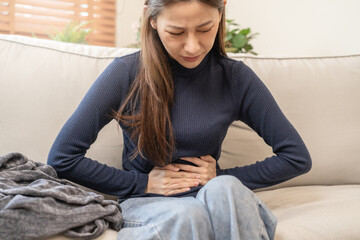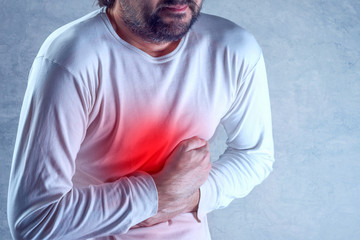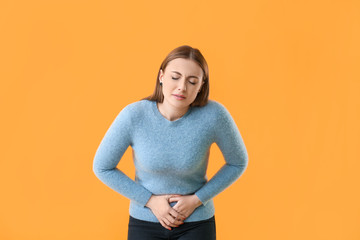Stomach pain (abdominal pain, stomach ache) is a pain that you feel somewhere between your chest and groin. Since most of the digestive organs are located inside the abdomen, it is likely that the main cause of pain may be related to them. The causes may or may not be related to serious problems requiring serious treatment or prevention. In the vast majority of cases, abdominal pain is not something serious and goes away, literally, after a few hours, sometimes days.

If you have recurrent attacks of stomach cramps and diarrhea, you may have a chronic condition such as irritable bowel syndrome (IBS).
What is the evidence of abdominal pain?
Less serious causes of abdominal pain include constipation, irritable bowel syndrome, food allergies, lactose intolerance, food poisoning and a stomach virus. Other, more serious causes include appendicitis, abdominal aortic aneurysm, intestinal obstruction, cancer, and gastroesophageal reflux.
Why does my stomach hurt so much?
The most common causes of abdominal pain or stomach upset can be divided into three general categories: digestive problems, inflammation, and female reproductive function (female diseases).
Digestive problems are a common problem of modern man due to eating disorders and diet, malnutrition (fast food, semi-finished products, fatty, fried, with emulsifiers, with preservatives, long-term storage, salty, spicy and not fresh food). It is directly related to diseases and painful sensations after and during meals, as well as exacerbation of chronic gastrointestinal diseases. If you experience abdominal pain and discomfort after eating, you may have an upset stomach, constipation, diarrhea, food allergies or food poisoning.
What is the most severe abdominal pain?
Other, more serious causes include appendicitis, abdominal aortic aneurysm, intestinal obstruction, cancer (oncological diseases) and gastroesophageal reflux. Sometimes abdominal pain can occur due to a non-abdominal problem, such as a heart attack, menstrual cramps, or pneumonia.
Can stress cause abdominal pain for several days?
How long can abdominal pain caused by stress last? It should not last more than a few hours and should pass almost immediately when the stressful situation is over. If an upset stomach lasts for more than a day, it is possible that stomach pain is caused by something other than stress, and you should consult a doctor.
What does it mean when a girl says she has a stomach ache?
Common causes of abdominal pain are infections, inflammation, menstrual cramps, blockages, neoplasms, and diseases or conditions of the abdominal cavity. Most of the causes of abdominal pain are not serious and are not a cause for concern. However, some abdominal pain may be signs of a serious illness.
What are the warning signs of abdominal pain?
Alarm signals include unrelenting pain, especially with abdominal tension, or pain transmitted to the back. Yellowing of the skin, dark urine and pale stools may indicate liver or gallbladder problems. Seek medical help in case of persistent pain or difficulty breathing, as this may indicate a potential heart or lung problem.
Where does the pain of flatulence and belching come from?
If the body cannot release enough gas, it can cause pain in the lower abdomen. The body removes excess gases through belching and flatulence. Belching releases excess gases from the stomach, and flatulence from the intestines.

What products produce gases?
If you often experience bloating, then there are common foods that emit gases:
- Beans and lentils.
- Vegetables such as cabbage, broccoli, cauliflower, bok choy and Brussels sprouts.
- Bran.
- Dairy products containing lactose.
- Fructose, which is found in some fruits and is used as a sweetener in soft drinks and other foods.
How to make sure that your stomach does not hurt every day?
Drink plenty of water and eat foods rich in fiber, such as fruits and vegetables, so that food passes easily and quickly through the digestive system. Avoid products that have expired or that have been stored for a long time and incorrectly. If you have a food allergy or intolerance, avoid eating foods that make you sick.
What kind of food improves stomach function?
Foods and drinks such as bananas, white rice, toast, crackers and broth have a mild effect on the digestive system and can help you recover from an upset stomach. It is best to avoid foods and drinks that are difficult to digest and can worsen gastrointestinal symptoms.
How to improve the condition of the stomach in 5 minutes?
Applying a hot water bottle, a hot water bottle, a hot towel or a thermal wrap to the stomach and back helps to relax the muscles and relieve cramps and abdominal pain, as well as pain passing into the back. Ideally, the temperature should be 40° Celsius. Taking a hot bath with foam and essential oils or a hot shower can also help.
Which drink improves the functioning of the stomach?
Mint tea and chamomile tea can be used to naturally relieve indigestion. They relax the muscles of the digestive tract and reduce cramps and cramps of the intestinal muscles.
What kills the stomach virus?
There is no cure for stomach flu. Antibiotics don't work on viruses — they work on bacterial infections. The best thing you can do to help your immune system do its job is to stay at home and rest, avoid drinking and eat a little if you can. Give your body the energy it needs to fight infection. It is even better to seek help from the center of the Academy of Regenerative Medicine (ARM) and undergo a full-fledged rehabilitation. In order to awaken the immune system of your body at the cellular and molecular level through naturopathy (natural regeneration methods).
What can not be eaten with stomach cramps?
If you have an upset stomach, you should avoid the following foods:
- Spicy food.
- Fatty or fatty foods.
- Fried food.
- Greasy food.
- Certain dairy products such as milk, soft cheeses and ice cream.
- Alcohol.
- Caffeine.
- Foods containing insoluble fiber, such as whole wheat products, nuts and seeds, beans, and raw and cruciferous vegetables.
How can you naturally make your stomach stop hurting?
The next time you feel unwell, try one of the following home remedies.
- Water. You lose water during the day due to sweating, breathing, and digesting food, especially if you have vomiting or diarrhea.
- Ginger.
- Peppermint.
- Chamomile tea.
- Essential oils and lamps with them.
- Heating through a heating pad.
- A warm shower.
What can I drink in the morning if I have an upset stomach?
Ginger is a very popular remedy for stomach problems, and for good reason, because it is time—tested. Drinking ginger tea first thing in the morning can alleviate stomach discomfort, nausea, vomiting and diarrhea. The recipe for making medicinal tea for abdominal pain is very simple. To make ginger tea, add a few tablespoons of finely grated fresh ginger to a cup of boiling water and insist for five minutes.
How to relieve abdominal pain?
Drink plenty of liquids, such as water. Reduce your consumption of coffee, tea and alcohol, as they can increase the pain. When you are allowed to eat again, start with clear liquids, then move on to soft foods such as crackers, rice, bananas or toast.

What position can I sleep in if my stomach hurts?
Simple steps such as sleeping on your left side can reduce the discomfort of peptic ulcer disease. Gravity is used in this position to help waste pass through the digestive tract. Sleeping on the left side can also reduce heartburn, as it reduces the level of gastric acid in the esophagus. The next best position for sleeping in pain is on your back with your head raised.
How can I make my stomach not hurt at night?
There are several preliminary measures so that the stomach does not hurt at night and they include:
- avoid eating before going to bed.
- lifting the headboard during sleep.
- avoid fatty or greasy foods, coffee or chocolate at night.
- avoid or limit alcohol consumption.
- avoid overeating.
- Do not use over-the-counter medications.
- go through rehabilitation in the ARM.
Is milk useful for indigestion?
It used to be believed that yes, that milk helps to reduce acidity in case of indigestion. It acts for several hours, covering the gastric mucosa and acting as a buffer against excess acid. However, it then stimulates the stomach to produce more stomach acid, which actually exacerbates the problem.
How to clean the stomach and intestines in 5 minutes?
A simple and fast, cheap way of cleansing: rinsing with salt water.
In order to quickly cleanse and cleanse the stomach and colon, mix 2-3 teaspoons of ordinary food or sea salt with a glass of warm water and drink the mixture on an empty stomach. In a few minutes, your colon will clear.


